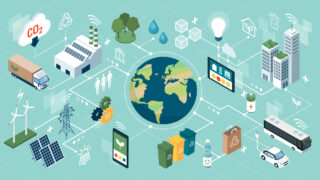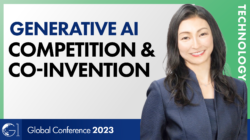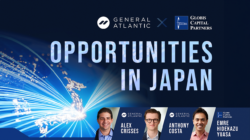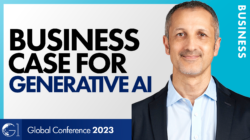Leading High Performing Remote Teams
How can leaders ensure that performance remains high in remote or hybrid-work environments?
Content Marketing
In this course, you’ll learn how compelling blogs, videos, podcasts, and other media can reach customers and drive sales. You’ll also learn steps for creating an effective content marketing plan, and some important ways to measure its impact and success.
Content marketing is a essential digital marketing strategy for companies looking to provide relevant and useful information to support your community and attract new customers.
Get started on your content marketing journey today.
Sustainable Innovation in Times of Disruption: Choices for a Better Society
There are opportunities for progress all around us. The key is to innovate on these opportunities sustainably.
To help identify most effective path forward, you'll need to gain a global perspective to these challenges in an open discussion. How can Japan and the world take action to create a more sustainable, innovative world? Where do you fit in?
It's time to find out.
Social Media & Digital Communications: Impact on Global Public Opinion
Social and digital media have dominated the communications industry for decades. But it's no secret that social media has the power to sway public opinion, and the way in which many companies use these platforms could be seen as manipulative.
What do companies need to be aware of when utilizing social and digital media? How can these mediums be used to better communicate strategically with the world?
Discover what top media and communications experts have to say.
CAGE Distance Framework
Want to expand overseas? The CAGE distance framework can help ensure you're constructing a solid global strategy in four areas: cultural, administrative, economic, and geographic. Learn how to leverage useful differences between countries, identify potential obstacles, and achieve global business success.
Servant Leadership
There's more to leadership than driving a team to profit. In fact, there's a word for looking beyond self-interest to prioritize individual growth: servant leadership. Try this course for a quick breakdown of what that is, how it works, and how it can lead to organizational success.
Strategy: Creating Value Inside Your Company
Have you ever wondered why certain companies are more successful than others? The answer is strategy: internal processes that control costs, allocate resources, and create value. This course from GLOBIS Unlimited can give you the tools you need for that strategic edge.
Strategy: Understanding the External Environment
To plan strategy on any level, you need to understand your company's external environment. In fact, your level of understanding can impact hiring, budgeting, marketing, or nearly any other part of the business world. Want to learn how to do all that? This course from GLOBIS Unlimited is the perfect first step!
Using Japanese Values to Thrive in Global Business
Japanese companies have unique cultural, communication, and operational challenges. But they also have values that have led to remarkable longevity. Check out this seminar to hear how these values help earn trust from overseas head offices and develop employees.
Marketing: Reaching Your Target
Every company works hard to get its products into the hands of customers. Are you doing everything you can to compete? In this course, you’ll find a winning formula to turn a product idea into real sales. Follow along through the fundamentals of the marketing mix and see how companies successfully bring products to market.
Basic Accounting: Financial Analysis
Want to compare your performance vs. a competitor? Or evaluate a potential vendor? Then you'll need to conduct a financial analysis. This course will teach you how to use three financial statements and evaluate financial performance in terms of profitability, efficiency, soundness, growth, and overall strength.
Career Anchors
What drives you to be good at your job?
Career anchors are based on your values, desires, motivations, and abilities. They are the immovable parts of your professional self-image that guide you throughout your career journey.
Try this short GLOBIS Unlimited course to identify which of the eight career anchors is yours!
Leadership with Passion through Kokorozashi
The key ingredient to success? Passion.
Finding your kokorozashi will unify your passions and skills to create positive change in society. This GLOBIS Unlimited course will help you develop the values and lifelong goals you need to become a strong, passion-driven leader.
While it might seem like vegetarians and vegans are a new voice in the societal landscape, communities across the globe have actually been opting for plant-based diets since ancient times. Philosophical and religious groups, in particular, have adopted going meatless for centuries. Even in the US, vegetarian communities have been around since the early 1800s. Nowadays, what started with Greek philosophers and Buddhist monks is becoming mainstream, helped along by social media and influential voices like Jane Goodall and Peter Dinklage.
The ways we raise cattle and consume meat are also huge issues for the future of sustainable business.
On the surface, what seems like a personal health or moral choice to go (or not go) meatless is, in fact, a growing concern for the future—for all of us. Vegetable-based diets are increasingly recognized as climate-friendly diets. Cattle need land, and a lot of that land comes from precious rainforest territory. Cows create huge amounts of methane, a harmful greenhouse gas. And when it comes to supply, cows and other animals are proving less and less sustainable as a food source for future generations.
What’s more, technology is making all of these problems infinitely solvable. New “meat analogue” alternatives and green economy solutions are unveiling huge opportunities for forward-thinking business leaders.
Sustainability-focused angel investor and CEO of Silverbirch Associates Patricia Bader-Johnston is especially mindful of the need to axe meat from our diet as a species. At the 2021 G1 Global Conference, she pulled no punches in her case for going meatless.
Next Article
The Golden Rules for Pitching Sustainability to Angel Investors
5 Ways Your Business Can Support the Circular Economy
The Circular Economy, Your Business, and Your Future
Transcript:
The Moral Argument for Going Meatless, by the Numbers
Patricia Bader-Johnston:
There are currently 7.8 billion people on the planet. We’re expecting there to be 10 billion people on the planet by 2050. Currently, we have enough food to feed all of those people.
But if you think about it in terms of cows, there are currently two cows for every human being on the planet. So if we’re projecting forward to feeding 10 billion people, how many cows are we gonna need?
Currently, livestock is taking up 60% more than any other form of biodiverse life on the planet. And it is one of the major causes of deforestation in areas like Brazil and around tropical rainforests—just to feed the appetite for meat.
So if we’re looking for better protein sources, we need to have more efficient ways of growing food. How food is grown, how the fertilizers are fixed, how they’re applied, the efficiency of producing more food—plant-based food—to feed 10 billion people.
Because there is no way cows can feed 10 billion people.
The Sustainability Risk of Relying on Cows
Bader-Johnston:
Not only is it impossible physically to have that many cattle roaming the range, [but] if you go to mass beef production factory farms that have become the norm, particularly in the US, it is cruelty beyond imagination to other living beings. What we’re seeing happening to poultry and to pigs and to cattle is beyond imagination. It’s like a Holocaust going on around us all the time.
The sheer cruelty of our appetite for meat is staggering, and it’s being driven by population. Currently we have 75 million displaced people in the world, refugees and people who have had to migrate because all of their income capability has disappeared because of climate change—the movement of people, the access to food.
The fact [is], we have three months of stored food on the planet. If we have drought or famine in four different regions, at the same time, we will run out of food as a planet in three months.





